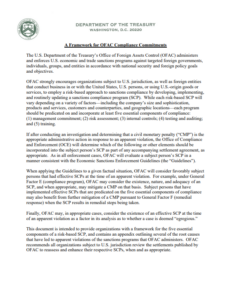On May 3, 2019, the US Treasury Department’s Office of Foreign Assets Control (OFAC) published A Framework for OFAC Compliance Commitments, which sets out OFAC’s views of the necessary elements of an effective economic sanctions compliance program.
OFAC strongly encourages organizations subject to US jurisdiction, as well as foreign entities that carry out business in or with the US, US persons, or using US-origin goods or services, to employ a risk-based approach to sanctions compliance by developing, implementing, and routinely updating a sanctions compliance program (SCP).
[smlsubform prepend=”GET THE SAFETY4SEA IN YOUR INBOX!” showname=false emailtxt=”” emailholder=”Enter your email address” showsubmit=true submittxt=”Submit” jsthanks=false thankyou=”Thank you for subscribing to our mailing list”]
It added that while each risk-based SCP will vary based on a various factors, such as including the company’s size and sophistication, products and services, customers and counterparties, and geographic locations, each program should be predicated on and incorporate at least five essential components of compliance. These are:
- Management commitment;
- Risk assessment;
- Internal controls;
- Testing and auditing;
- Training.
If after carrying out an investigation and determining that a civil monetary penalty (CMP) is the appropriate administrative action in response to an apparent violation, the Office of Compliance and Enforcement (OCE) will determine which of the following or other elements should be included on the subject person’s SCP, as part of any accompanying settlement agreement, as appropriate. As in all enforcement cases, OFAC will evaluate a subject person’s SCP in a manner consistent with the Economic Sanctions Enforcement Guidelines.
What is more, when applying the Guidelines to a certain factual situation, OFAC will consider favorably subject persons that had effective SCPs at the time of an apparent violation. For example, under General Factor E, OFAC may consider the existence, nature, and adequacy of an SCP, and when necessary, may mitigate a CMP on that basis.
Subject persons that have applied effective SCPs that are predicated on the five essential components of compliance may also benefit from additional mitigation of a CMP pursuant to General Factor F when the SCP results in remedial steps being taken.
Finally, OFAC may, in appropriate cases, consider the existence of an effective SCP at the time of an apparent violation as a factor in its analysis as to whether a case is considered ‘egregious.’
Explore more in the following PDF
































































